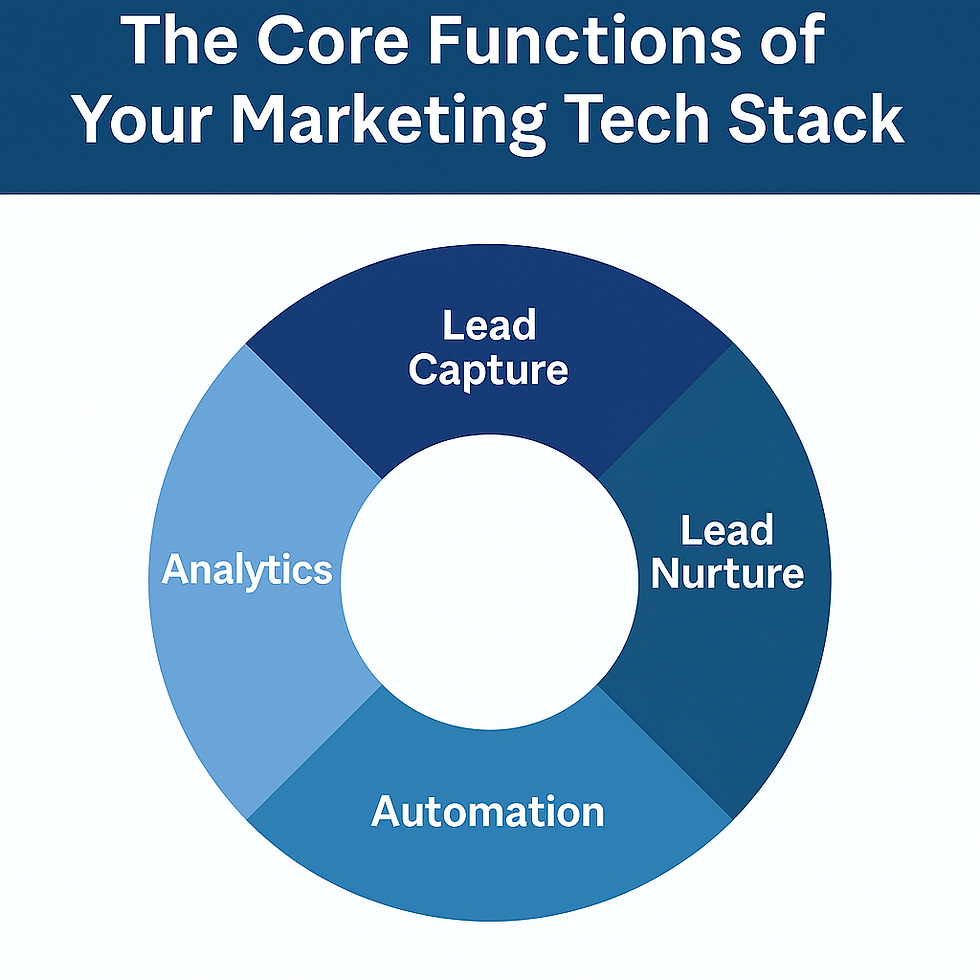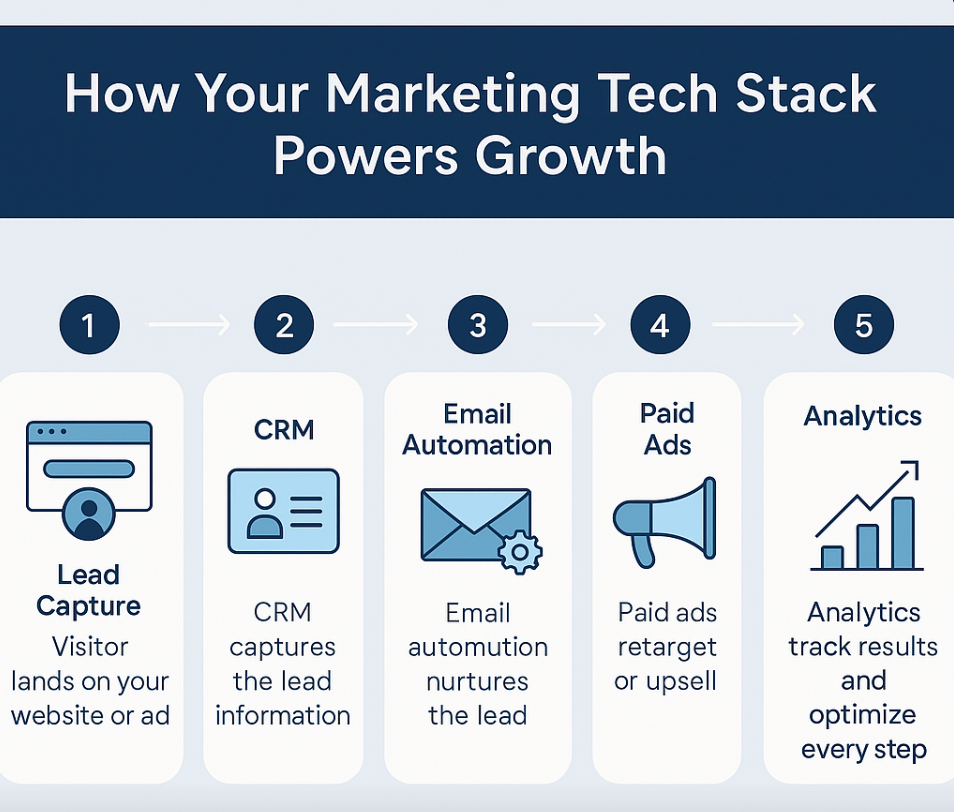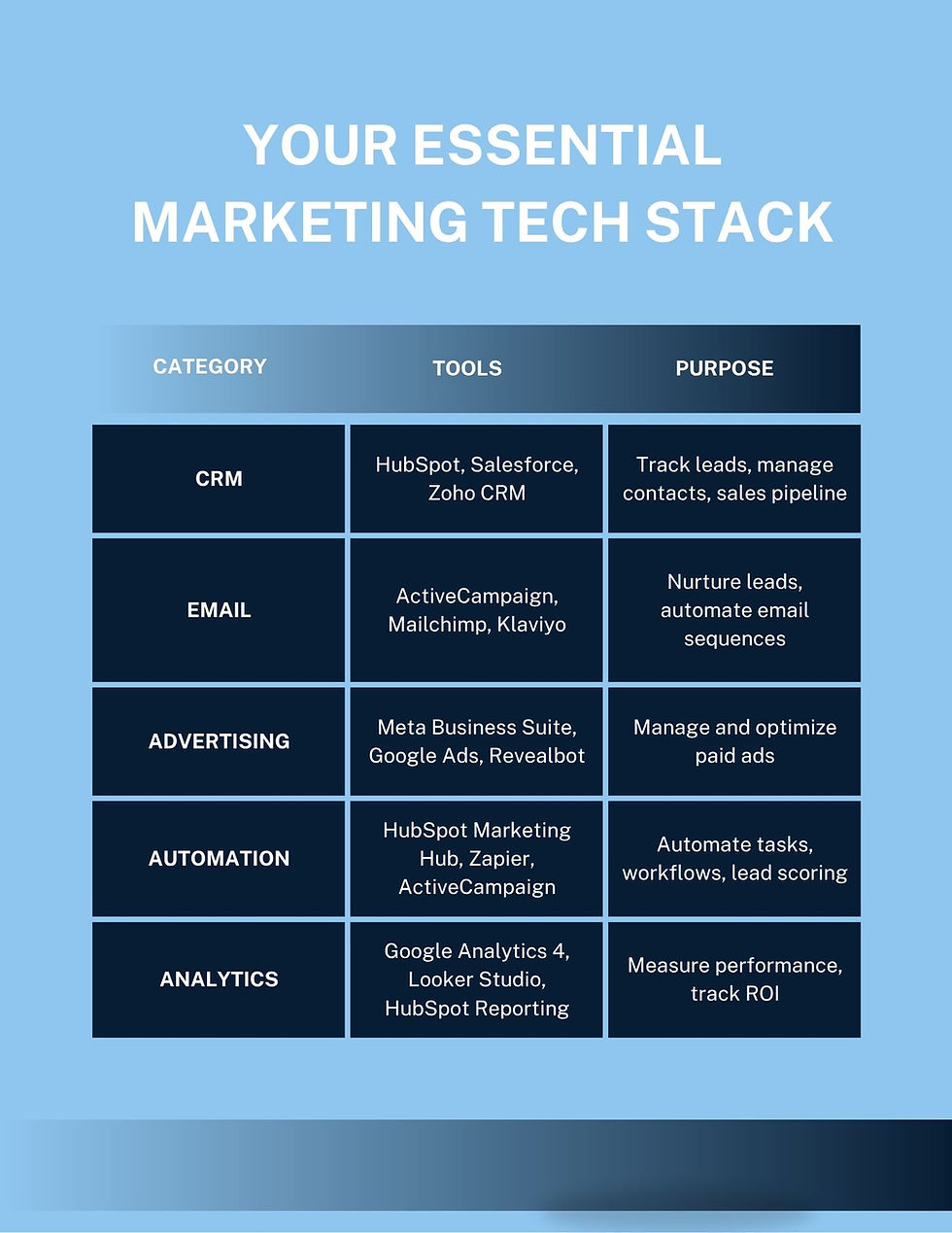Building Your Marketing Tech Stack: The Essential Tools Every Growing Business Needs
- Jan 16, 2025
- 3 min read
The right marketing strategy is powerful, but without the right tools, even the best strategy can fall flat. As your business grows, your marketing tech stack becomes the foundation that supports lead generation, customer nurturing, sales conversion, and long-term growth.
Choosing the right tools can feel overwhelming, especially with so many platforms available. But you don’t need everything, you need the right mix of tools that fit your goals, budget, and team capacity. Here’s a practical breakdown of the essential marketing tech stack every growing business should consider, and how we help businesses implement these systems for long-term success.

1. CRM (Customer Relationship Management) Platform
At the center of your tech stack should be a CRM. This tool helps you organize leads, track customer interactions, monitor deal stages, and nurture relationships over time.
Key CRM features to look for:
Lead and contact management
Sales pipeline tracking
Automated workflows and reminders
Integration with email, ads, and website forms
Reporting and forecasting dashboards
Top CRM platforms we help businesses implement:
HubSpot CRM (great for scaling businesses with built-in marketing tools)
Salesforce (enterprise-level customization)
Zoho CRM (cost-effective for small businesses)
A strong CRM ensures no lead gets lost and allows you to track your sales funnel from initial contact to closed deal.
2. Email Marketing & Automation Platforms
Email remains one of the most effective and cost-efficient marketing channels. Your email platform should support both one-time campaigns and automated sequences to nurture leads.
Key email platform features:
Segmented email lists
Automated nurture sequences
Personalized email content
A/B testing capabilities
Deliverability and compliance tools
Top email tools we regularly implement:
ActiveCampaign (combines CRM-level automation with email marketing)
Mailchimp (simple, affordable for small businesses)
Klaviyo (excellent for e-commerce brands)
With the right automation, your emails work 24/7 — building relationships while you focus on other areas of your business.
3. Paid Advertising & Campaign Management Tools
Paid ads can accelerate growth — but managing campaigns manually across platforms can quickly become inefficient. Ad tools help you manage, track, and optimize performance across channels.
Key advertising tool features:
Unified dashboard for multi-channel ads
Budget pacing and optimization tools
Conversion tracking and attribution
Audience segmentation and retargeting
Advertising tools we recommend:
Meta Business Suite (for Facebook & Instagram ads)
Google Ads Manager (search, YouTube, and display ads)
AdEspresso or Revealbot (simplify multi-platform management and testing)
The right ad management tools help you spend smarter, optimize faster, and ensure your ad budget is working as efficiently as possible.

4. Marketing Automation Software
Automation tools streamline repetitive tasks, integrate your platforms, and create consistent customer experiences across multiple touchpoints.
Key marketing automation features:
Drip email workflows based on customer behavior
Lead scoring and qualification
SMS/text automation
CRM and e-commerce integrations
Workflow triggers based on user actions
Powerful automation platforms we help businesses set up:
HubSpot Marketing Hub (all-in-one automation with CRM integration)
ActiveCampaign (affordable but highly advanced automation)
Zapier (connects multiple tools for custom automation workflows)
Automation allows your business to scale without adding headcount — ensuring every lead gets the right message at the right time.
5. Analytics & Reporting Platforms
Without data, you’re guessing. Analytics tools help you track what’s working, optimize campaigns, and make informed marketing decisions.
Key analytics platform features:
Website traffic tracking
Campaign attribution and ROI measurement
User behavior insights (clicks, form fills, conversions)
Funnel tracking and sales forecasting
Real-time reporting dashboards
Essential analytics platforms we use:
Google Analytics 4 (core website tracking platform)
Google Tag Manager (for advanced event tracking)
HubSpot Reporting (all-in-one CRM and marketing data)
Looker Studio (formerly Google Data Studio) (for custom reporting dashboards)
Analytics transform your marketing from reactive to proactive — helping you double down on what works and eliminate what doesn’t.

Final Thoughts: Build the Tech Stack That Supports Your Growth
Your marketing tech stack doesn’t need to be complicated — it needs to be functional, connected, and scalable. The right tools help you:
Capture more leads
Nurture prospects automatically
Improve conversions
Measure success with confidence
Scale your business without adding unnecessary complexity
At Dolomites Consulting Group, we help businesses build smart, customized marketing tech stacks that fit their industry, growth stage, and goals — while providing ongoing support as your business evolves.




Comments